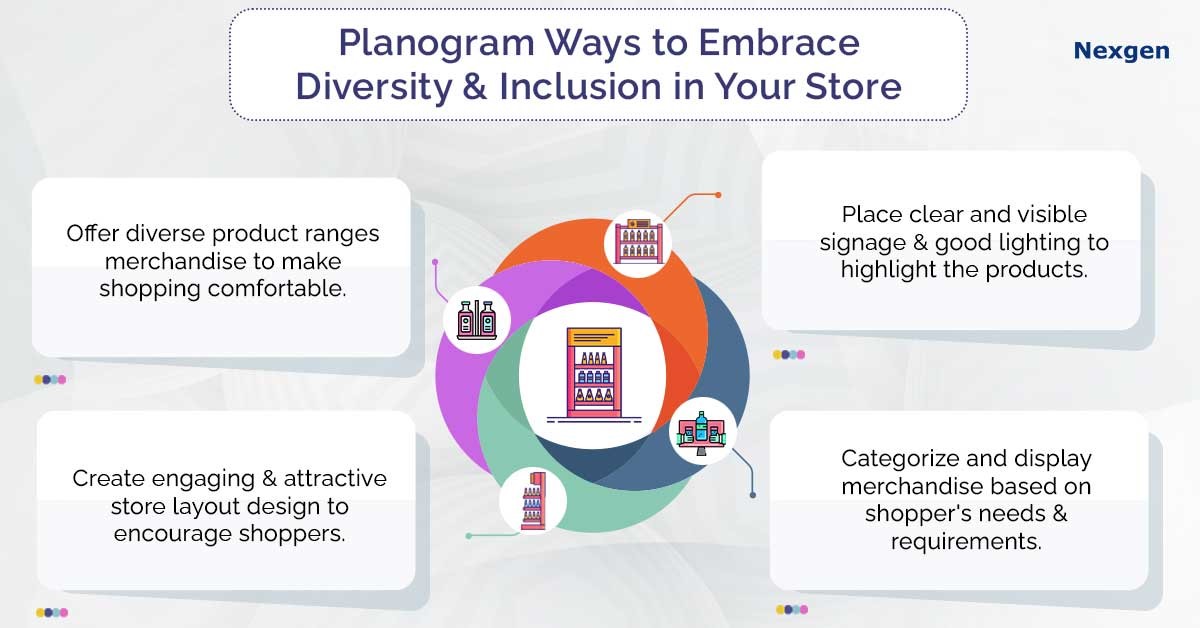Diversity and inclusion have become buzzwords in today’s world. But in retail, it is about more than just creating a diverse work environment. It is about showing the customer where you stand through your products and promotional strategies to make them feel more comfortable in your store.
According to reports, 40% of ethnic minority customers have switched to stores committed to inclusion and diversion. However, it is important to build a sustainable relationship with your community and shoppers for long-term brand loyalty and to drive sales. You can support the change towards a more welcoming and inclusive society by using your retail space. In this blog, we will talk about many approaches to using visual merchandising planograms to promote diversity and inclusion in your brick-and-mortar stores. Planogram is a visual representation of store shelves to help retailers optimize the shelf space used by each product to maximize sales. This helps retailers provide well-organized, category-wise products to customers and satisfy their shopping needs.
Planogram Ways to Embrace Diversity & Inclusion in Your Store
Most shoppers would like to shop from stores that offer products that are accessible and welcoming to all consumers, regardless of race, sexuality, age, gender, and religion. Retail stores are becoming more inclusive nowadays since they know how much diversity is essential to their success. Shoppers expect to see a range of skin tones, body types, and gender identities in your store before making purchases. For example, when your customer is looking for plus-size outfit and has trouble finding clothing in their size, it will make them dissatisfied with your store experience. To avoid certain situations, you can opt for custom development fixtures with the help of planogram experts. Visual merchandising experts who provide planogram services will customize store shelves as per the requirements of retailers to boost sales. These experts will also help you with shelf planning by filling the right products on shelves based on consumer behavior and market trends. Following are some planogram strategies to embrace diversity in store to boost sales:

- Include diverse product ranges: The first step in creating diversity and inclusion in your retail store is to offer a diverse range of products into your merchandise. You can incorporate extended sizes in your product lines. Most clothing stores offer products ranging from XS to XL. But these sizes are not compatible with all-body types. You can include plus sizes inclusive of different body types to make your customers feel more comfortable and welcoming in the store. You can also offer a range of skin tones in your store. Individuals who do not identify as people of color frequently do not consider what "neutral" colors might be for minority groups. Dark tones are underrepresented because "neutral" tones are significantly biased towards the light side of the skin tone spectrum, especially when it comes to shapewear and makeup. Even product lines that make a point of catering to different skin tones frequently fall short of fitting every skin tone. Create dedicated gender-neutral colors that appeal to everyone.
- In-store displays to entice shoppers: For apparel retailers, displaying inclusive mannequins is a move that is frequently viewed as long overdue. Given that women's average dress sizes in the U.S. are currently 14–16, it can be surprising that the sample size in the country is still regarded as 0-4. These size figures indicate that most American women are also familiar with this feeling. Including mannequins that display merchandise on various body types and sizes will help shoppers get a better idea of how your clothing fits them. You can also group the merchandise based on its style, not by size, which can lead to a more inclusive shopping experience. For example, displaying plus-size and not gender specific items in stores can encourage customers to make purchases.
- Store layout design to improve the shopping experience: Becoming inclusive does not mean you must completely redesign your store. In most cases, you can come up with the idea of simply updating the displays and store layout. According to reports, 61 million U.S. adults have disabilities. That means, about 1 in 4 customers that interact with each store are handicapped. You can add ramps to the store entrance that fit a 1:12 slope ratio, which means 12 inches of length is required for every 1 inch of height, to accommodate persons with mobility difficulties. You should also think about using ramps exclusively inside your store whenever there is an elevation difference. In addition, adding handrails to all ramps and even around your store will provide much greater accessibility to those who have difficulty navigating spaces.
Overview of Nexgen Planogram Services
Nexgen offers store-specific planograms for clients that optimize sales and achieve category objectives. We create customized planograms for your business to ensure that these are better aligned with your goals and merchandising strategies. Our expertise in planogram automation helps us build planograms faster, better and consistently. Whether it is creating a planogram from scratch, or a typical reset, we have the knowledge, tools, and experience to get the job done for you.
Get Your Free Trial Now!